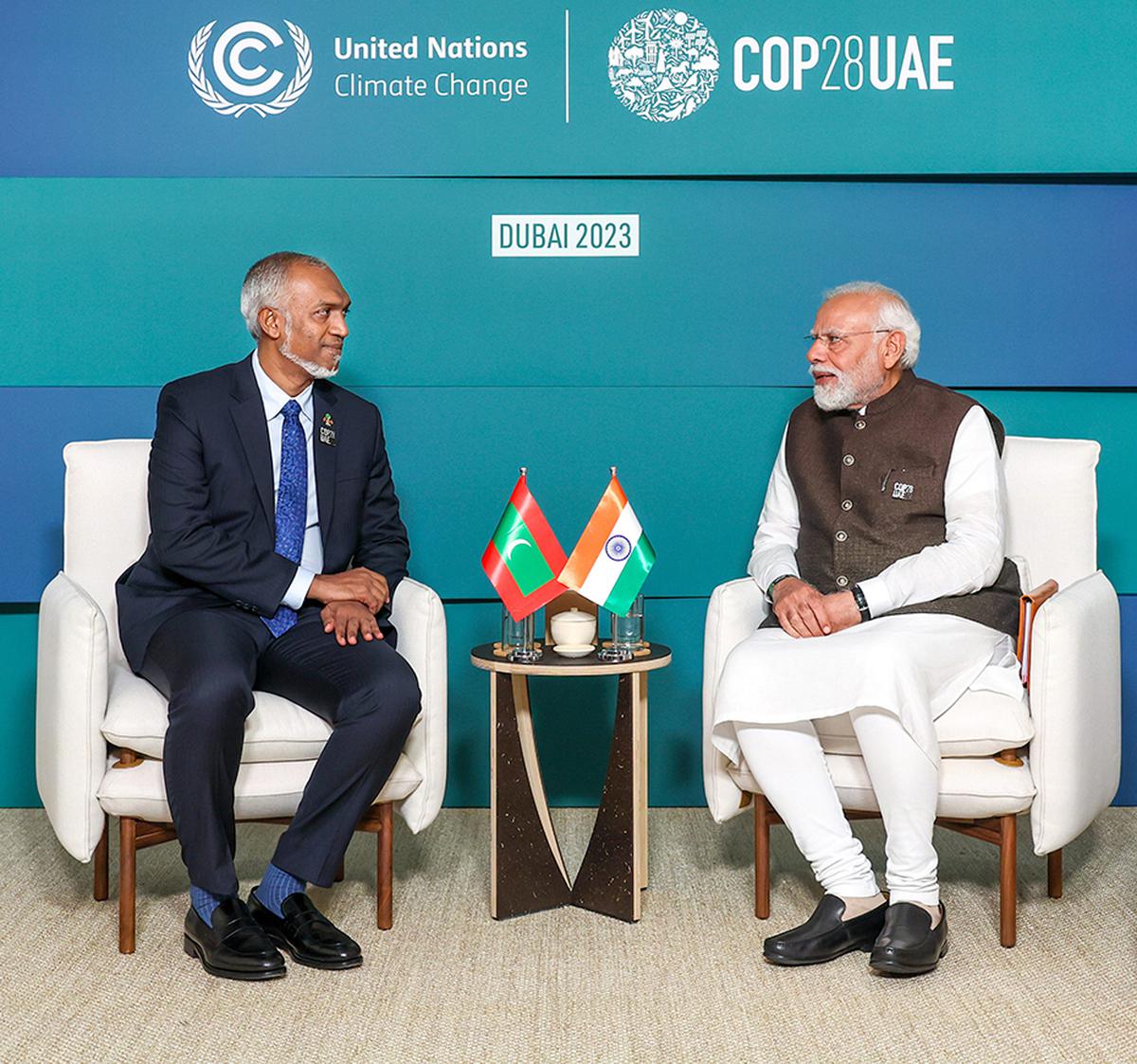Global Politics
Maldives Reconsiders India Agreements Amid Concerns Over Sovereignty

New Delhi: Amid ongoing efforts to deepen “close and historic” ties between India and the Maldives, a parliamentary committee in the Maldives has announced a review of three agreements signed by the previous administration. These agreements, signed under former President Ibrahim Solih, a pro-India leader, are now under scrutiny by the current administration led by President Mohamed Muizzu. The review stems from concerns that these agreements may have compromised the sovereignty of the Maldives.
Agreements Under Review
The agreements in question include:
- An agreement for hydrographic surveys.
- A project for building the Uthuru Thilafalhu dockyard, funded by Indian grant assistance.
- The deployment of a Dornier aircraft gifted by India for humanitarian, search, and rescue operations.
“Today, the National Security Services Committee of the parliament has decided to conduct a parliamentary inquiry to investigate actions undertaken by President Solih’s administration that undermined the sovereignty and independence of the Maldives,” said central Hithadhoo constituency’s MP Ahmed Azaan, as reported by Maldivian media. Azaan proposed a parliamentary inquiry, alleging that the previous government’s actions adversely affected the country’s independence and sovereignty.
Recent Developments and Diplomatic Engagements
President Muizzu’s government had previously indicated it would not renew the agreement with the Indian Navy for joint hydrographic surveys in Maldivian waters. Despite this stance, President Muizzu attended Prime Minister Narendra Modi’s swearing-in ceremony and subsequently met with President Droupadi Murmu. During these meetings, Muizzu expressed his gratitude for India’s continuous support and assistance to the Maldives. “He conveyed that he looks forward to further strengthening existing relations,” said a statement from his office.
Controversy and Political Reactions
The diplomatic discourse between the two nations faced turbulence when three deputy ministers from the Maldives used offensive language on social media against PM Modi’s posts about his visit to Lakshadweep. These posts highlighted the natural beauty of the islands and their potential as tourist attractions for Indian visitors. The remarks from the deputy ministers drew strong condemnation from former Presidents Ibrahim Solih and Mohamed Nasheed, who both criticized the ministers’ comments.
Broader Implications
The review of these agreements reflects a significant shift in the Maldives’ approach to its bilateral relations with India. While the Muizzu administration has expressed a desire to maintain strong ties with India, the decision to revisit these agreements indicates a balancing act between national sovereignty and international cooperation. This move could potentially reshape the strategic and economic partnership between the two nations.
Historical Context and Strategic Interests
India and the Maldives have historically enjoyed close relations, with India being a key partner in various development projects in the Maldives. The agreements under review were part of a broader framework of cooperation aimed at enhancing maritime security, infrastructure development, and humanitarian assistance.
- Hydrographic Surveys: The joint hydrographic surveys were intended to map the underwater topography around the Maldives, crucial for maritime navigation, resource management, and environmental protection.
- Uthuru Thilafalhu Dockyard: The dockyard project, supported by Indian grants, was envisioned to bolster the maritime capabilities of the Maldives, providing a strategic asset for both civilian and defense purposes.
- Dornier Aircraft: The Dornier aircraft, gifted by India, was meant to enhance the Maldives’ ability to conduct search and rescue operations, humanitarian missions, and surveillance activities.
Potential Outcomes of the Inquiry
The parliamentary inquiry could lead to several outcomes, ranging from the reaffirmation of these agreements with modifications to their potential cancellation. Such decisions will likely depend on the findings of the parliamentary committee and the broader political climate in the Maldives.
- Reaffirmation with Modifications: The agreements might be upheld with certain amendments to address sovereignty concerns. This would allow the Maldives to retain the benefits of these agreements while ensuring greater control over their implementation.
- Cancellation of Agreements: If the inquiry concludes that the agreements significantly undermine sovereignty, they could be terminated. This could strain diplomatic relations but might also prompt renegotiation of terms more favorable to the Maldives.
- Increased Domestic Scrutiny: The review process itself may lead to increased scrutiny of future agreements with India and other countries, ensuring that national interests are adequately safeguarded.
Future Prospects for India-Maldives Relations
Despite the current review, both nations have expressed a commitment to maintaining and enhancing their bilateral relationship. The Maldives’ strategic location in the Indian Ocean makes it a critical partner for India in maintaining regional security and stability. Continued dialogue and diplomatic engagement will be essential in navigating the complexities of these agreements and fostering a mutually beneficial partnership.
In conclusion, the review of these three agreements signifies a critical juncture in India-Maldives relations. Balancing sovereignty concerns with the advantages of international cooperation will be a key challenge for the Muizzu administration. The outcome of this review will likely shape the future trajectory of diplomatic and strategic ties between the two nations, emphasizing the importance of transparent and balanced agreements in international relations.
